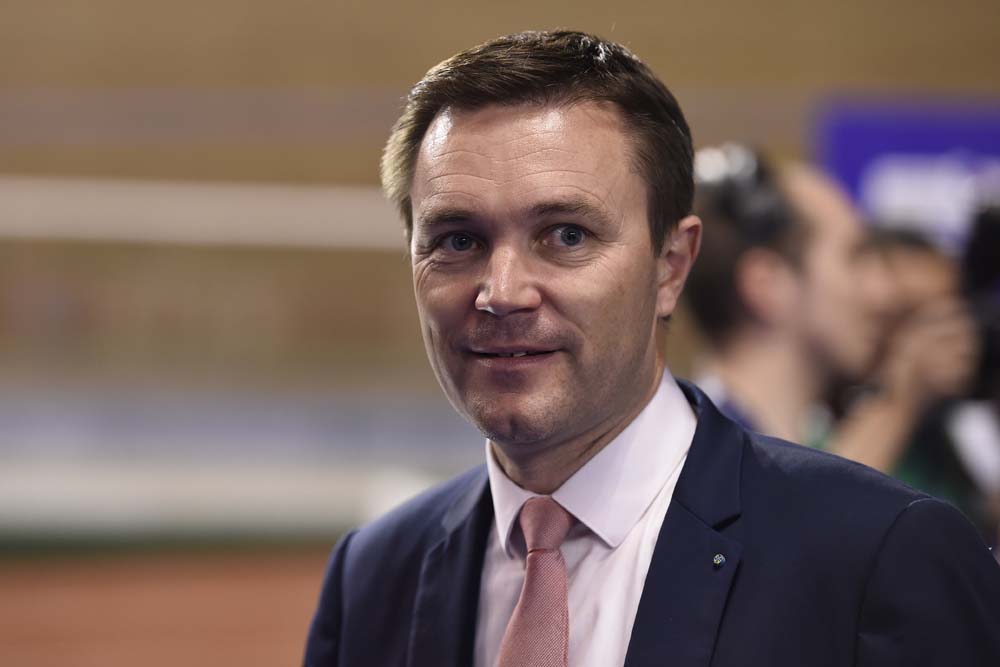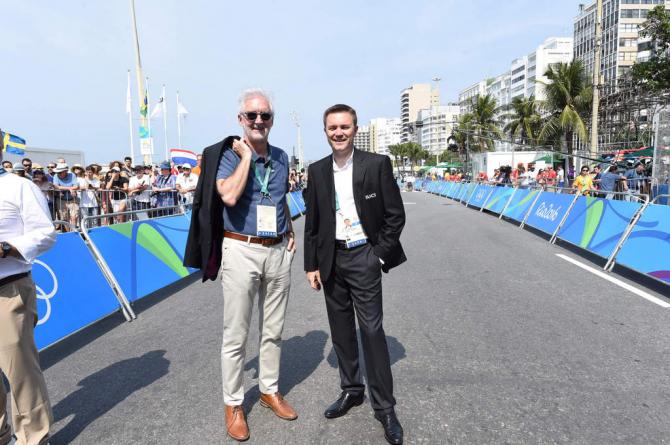David Lappartient: A UCI president in the making?
A profile of one of the key players in cycling politics, who has never lost an election

David Lappartient announced last week that he will not seek reelection for a third term at the head of the French Cycling Federation (FFC) in order to focus on his international duties as president of the European Cycling Union (UEC), president of the Professional Cycling Council (CCP) and vice-president of the UCI. Though he's yet to decide or announce that he'll challenge Brian Cookson for the presidency of the UCI in Bergen, Norway, on September 2017, many observers of the cycling world see him as a UCI president in the making. Who is he really?
Aged 43, Lappartient hails from Brittany, the hotbed of French cycling that has produced four Tour de France winners (Lucien Petit-Breton, Jean Robic, Louison Bobet and Bernard Hinault) but, interestingly, no president of the FFC before him. He comes from a cycling family of riders, race organisers, and referees. His younger brother Jérôme is a UCI commissaire. He himself raced, became a Tour de France time keeper at the age of 24 when he represented the young cyclists (U26) on the board of the FFC and presided over the cycling club Vélo Club de Rhuys from 1997 to 2007. Since 2006, he has organised the UCI 1.1 Grand Prix de Plumelec. He's a land surveyor engineer who founded his own company before entering politics as a member of liberal party UMP. He has been the mayor of Sarzeau since 2008, provincial councillor of the Morbihan since 2011, and president of the natural park of the gulf of Morbihan since 2015. He’s married with three children.
Never lost an election
Lappartient is a political machine. Every time he has been a candidate for an election, he has won, whether for the Breton cycling committee, the FFC, or local politics. His first run to the municipality of Sarzeau was a tight victory, but six years later he collected 71.31 per cent of the vote for his reelection. In February 2009, he became the FFC president, beating Michel Callot and legendary sports director Cyrille Guimard with 56.1 per cent of the vote, but four years later he was reappointed with 86.89 per cent in his favour and no one to challenge him. In March 2013, he was opposed for the presidency of the UEC by Milan-San Remo and Paris-Roubaix winner Andreï Tchmil, who was the president of the Moldovan cycling federation. He won with 73.91 per cent of the vote. That year, he was touted to challenge Pat McQuaid as UCI president but convinced Brian Cookson to run instead. He has since become an opponent to the Englishman but he might not go against him until he's sure to have enough supporters among the voters.
What has he done for French cycling?
He led the project of the Centre National du Cyclisme in the south west of Paris, which includes the FFC headquarters, a BMX track, and the velodrome of Saint-Quentin-en-Yvelines that was built between 2011 and 2014 and that hosted the 2015 Track World Championships. Under his presidency, France collected 169 World and European titles across all disciplines, as well as 385 medals. In road cycling, France went from fourteenth in the UCI rankings in 2008 to return as the number one nation this year. In the same period, the number of licensees increased by 15.08 per cent. He reduced the financial deficit of the FFC from 1,597,000 euros when he succeeded Jean Pitallier to 147,000 euros last year. He also modified the governance of the FFC with a parliament for large debates and an executive committee for urgent decisions.

Lappartient grew up in the country of the world's biggest race and his love for the Tour de France is undisputed. He was appointed by the UCI as a Tour de France commissaire at a very young age. His father, Jo, has been employed by ASO as a race regulator on a motorbike, then a black board man dressed in yellow and, more recently, a car driver for an anti-doping inspector. In February 2013, at the time he introduced his project to create a French equivalent of Team Sky under the FFC - which was meant to be a WorldTour team that funded track and mountain-biking but was never possible to finance - he also announced the Tour de France to be contested by national teams. ASO's general manager Yann Le Moënner was quick to state that it was not part of their plans. After ASO decided to leave the WorldTour in December last year, Lappartient brought them back in June in a compromise that now doesn't please the teams. The UEC appointed ASO to organise the European championships. ASO is also involved in the technical department of the UCI Road World Championships in Doha, where they organise the Tour of Qatar every year.
The latest race content, interviews, features, reviews and expert buying guides, direct to your inbox!
In his speeches, Lappartient usually puts sport ahead of business. Under his presidency, championships get assigned according to sporting criteria first (Alberto Contador hasn't had any World Championships designed on a climber's course during his whole career). Like anyone, he's eager to globalise cycling but insists on races writing their own history and attracting crowds and media before being upgraded to the WorldTour once they prove to be successful. He's in favour of reducing the number of riders per team in the Grand Tours but he's not a revolutionary so he wouldn't go below eight instead of the current nine. To make the racing more interesting, he also implemented the 'no ear-piece' policy at the French national championships since 2009. The UCI then decided to ban them but, after a threatened boycott of the Tour of Beijing, the teams managed to keep them in the WorldTour and the UCI reintroduced them for all races this year. The European Championships in Plumelec, however, were contested without radio communication between riders and staff.
2016 was a dark year for officiating, with controversial and weak decisions being taken by commissaires [Arnaud Démare possibly helped by a team car in Milan-San Remo, Chris Froome given the time of Bauke Mollema after a crash up the Mont Ventoux at the Tour de France, the crash caused by Mark Cavendish in the Omnium at the Olympics, 93 riders reintegrated after finishing well outside of the time cut at the Vuelta a Espana, etc.], and, if he became UCI president, Lappartient would probably put emphasis on training for judges and sporting power over race organisers.